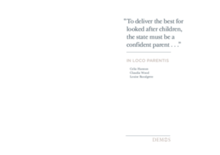This report was produced by the UK-based independent think tank, Demos. An excerpt of the executive summary is found below:
In media debate and policy discussions the care system is frequently described as failing. This negative view of care in England and Wales is closely related to how it is evaluated and the way that data on young people’s outcomes is misinterpreted – both of which tell a misleading story about its impact. In reality, there is a dissonance between the evidence on the impact of care, and the public perception of the system. Currently, this stigmatisation of the care system, combined with concern about the upfront costs to the state, means that some children who might benefit from the care system do not do so. Children enter care for a variety of reasons and go on to have very different journeys while they are there. If the care system is to be successful, it needs to be flexible and responsive enough to address the needs of individual children, their carers and their birth families. When the care system is used effectively in this way it can be a powerful tool for improving the lives of vulnerable children and young people. A strong body of evidence and our own primary research shows the most positive experiences of care, and the best outcomes for looked-after children, to be associated with the following three factors:
· early intervention and minimum delay
· stability during care
· supported transitions to independence
In this report we will consider what the care system would look like if it were reconfigured to avoid the delay, instability and abrupt transitions that many young people still experience. We go on to show that this type of system could also be less costly to the state in both the short term and over the long term.
For more information, please visit the Demos website at: www.demos.co.uk
©Demos

